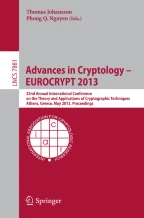Abstract
The hardness of the Learning-With-Errors (LWE) Problem has become one of the most useful assumptions in cryptography. It exhibits a worst-to-average-case reduction making the LWE assumption very plausible. This worst-to-average-case reduction is based on a Fourier argument and the errors for current applications of LWE must be chosen from a gaussian distribution. However, sampling from gaussian distributions is cumbersome.
In this work we present the first worst-to-average case reduction for LWE with uniformly distributed errors, which can be sampled very efficiently. This new worst-to-average-case connection comes with a slight drawback and we need to use a bounded variant of the LWE problem, where the number of samples is fixed in advance. Most applications of LWE can be based on the bounded variant. The proof is based on a new tool called lossy codes, which might be of interest in the context other lattice/coding-based hardness assumptions.
Chapter PDF
Similar content being viewed by others
References
Agrawal, S., Boneh, D., Boyen, X.: Lattice Basis Delegation in Fixed Dimension and Shorter-Ciphertext Hierarchical IBE. In: Rabin, T. (ed.) CRYPTO 2010. LNCS, vol. 6223, pp. 98–115. Springer, Heidelberg (2010)
Applebaum, B., Cash, D., Peikert, C., Sahai, A.: Fast Cryptographic Primitives and Circular-Secure Encryption Based on Hard Learning Problems. In: Halevi, S. (ed.) CRYPTO 2009. LNCS, vol. 5677, pp. 595–618. Springer, Heidelberg (2009)
Applebaum, B., Ishai, Y., Kushilevitz, E.: How to garble arithmetic circuits. In: FOCS, pp. 120–129 (2011)
Brakerski, Z., Gentry, C., Vaikuntanathan, V.: (Leveled) fully homomorphic encryption without bootstrapping. In: ITCS, pp. 309–325 (2012)
Bellare, M., Kiltz, E., Peikert, C., Waters, B.: Identity-based (Lossy) trapdoor functions and applications. In: Pointcheval, D., Johansson, T. (eds.) EUROCRYPT 2012. LNCS, vol. 7237, pp. 228–245. Springer, Heidelberg (2012)
Banerjee, A., Peikert, C., Rosen, A.: Pseudorandom Functions and Lattices. In: Pointcheval, D., Johansson, T. (eds.) EUROCRYPT 2012. LNCS, vol. 7237, pp. 719–737. Springer, Heidelberg (2012)
Brakerski, Z.: Fully Homomorphic Encryption without Modulus Switching from Classical GapSVP. In: Safavi-Naini, R. (ed.) CRYPTO 2012. LNCS, vol. 7417, pp. 868–886. Springer, Heidelberg (2012)
Brakerski, Z., Vaikuntanathan, V.: Efficient Fully Homomorphic Encryption from (Standard) LWE. In: FOCS, pp. 97–106 (2011)
Cash, D., Hofheinz, D., Kiltz, E., Peikert, C.: Bonsai Trees, or How to Delegate a Lattice Basis. In: Gilbert, H. (ed.) EUROCRYPT 2010. LNCS, vol. 6110, pp. 523–552. Springer, Heidelberg (2010)
Dodis, Y., Ostrovsky, R., Reyzin, L., Smith, A.: Fuzzy Extractors: How to Generate Strong Keys from Biometrics and Other Noisy Data. SIAM J. Comput. 38(1), 97–139 (2008)
Goldwasser, S., Kalai, Y.T., Peikert, C., Vaikuntanathan, V.: Robustness of the Learning with Errors Assumption. In: ICS, pp. 230–240 (2010)
Gentry, C., Peikert, C., Vaikuntanathan, V.: Trapdoors for hard lattices and new cryptographic constructions. In: STOC, pp. 197–206 (2008)
Lyubashevsky, V., Peikert, C., Regev, O.: On Ideal Lattices and Learning with Errors over Rings. In: Gilbert, H. (ed.) EUROCRYPT 2010. LNCS, vol. 6110, pp. 1–23. Springer, Heidelberg (2010)
Micciancio, D., Mol, P.: Pseudorandom Knapsacks and the Sample Complexity of LWE Search-to-Decision Reductions. In: Rogaway, P. (ed.) CRYPTO 2011. LNCS, vol. 6841, pp. 465–484. Springer, Heidelberg (2011)
Micciancio, D., Mol, P.: Pseudorandom Knapsacks and the Sample Complexity of LWE Search-to-Decision Reductions. IACR Cryptology ePrint Archive, 2011:521 (2011)
Micciancio, D., Peikert, C.: Trapdoors for Lattices: Simpler, Tighter, Faster, Smaller. In: Pointcheval, D., Johansson, T. (eds.) EUROCRYPT 2012. LNCS, vol. 7237, pp. 700–718. Springer, Heidelberg (2012)
Micciancio, D., Peikert, C.: Hardness of SIS and LWE with Small Parameters. IACR Cryptology ePrint Archive, 2013:069 (2013)
Peikert, C.: Public-key cryptosystems from the worst-case shortest vector problem: extended abstract. In: STOC, pp. 333–342 (2009)
Pietrzak, K.: Subspace LWE. In: Cramer, R. (ed.) TCC 2012. LNCS, vol. 7194, pp. 548–563. Springer, Heidelberg (2012)
Peikert, C., Waters, B.: Lossy trapdoor functions and their applications. In: STOC, pp. 187–196 (2008)
Regev, O.: On lattices, learning with errors, random linear codes, and cryptography. In: STOC, pp. 84–93 (2005)
Author information
Authors and Affiliations
Editor information
Editors and Affiliations
Rights and permissions
Copyright information
© 2013 International Association for Cryptologic Research
About this paper
Cite this paper
Döttling, N., Müller-Quade, J. (2013). Lossy Codes and a New Variant of the Learning-With-Errors Problem. In: Johansson, T., Nguyen, P.Q. (eds) Advances in Cryptology – EUROCRYPT 2013. EUROCRYPT 2013. Lecture Notes in Computer Science, vol 7881. Springer, Berlin, Heidelberg. https://doi.org/10.1007/978-3-642-38348-9_2
Download citation
DOI: https://doi.org/10.1007/978-3-642-38348-9_2
Publisher Name: Springer, Berlin, Heidelberg
Print ISBN: 978-3-642-38347-2
Online ISBN: 978-3-642-38348-9
eBook Packages: Computer ScienceComputer Science (R0)
